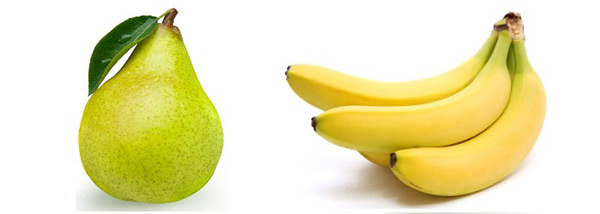KANNAPOLIS—Athletes who want to improve their performance should stop by the grocery store on their way to the gym and pick up some bananas and pears.
Scientists Nick Gillit, PhD, and David Nieman, DrPH, investigated the impact of eating bananas and pears before and during exercising as opposed to just drinking water. Gillit is the director of the Dole Nutrition Institute (DNI), and Nieman is the director of the Appalachian State University Human Performance Laboratory, both located at the North Carolina Research Campus (NCRC) in Kannapolis.
In the study “Metabolomics-Based Analysis of Banana and Pear Ingestion on Exercise Performance and Recovery” published in the Journal of Proteome Research, they found performance times of the cyclists studied were 5 percent and just over 3 percent faster when banana and pears, respectively, were consumed versus water.
“Many athletes train and race without eating or drinking anything other than water,” Nieman said. “There are multiple exercise performance and recovery benefits from ingesting sugar, especially when that sugar comes from fruit.”
Gillit and Nieman observed 20 male cyclists during their recent study. Each participant visited the Human Performance Laboratory three times, two weeks apart. After fasting overnight, they drank only water or consumed water with bananas or pears before cycling 75 kilometers at high intensity. The scientists measured metabolite shifts in the blood before and after the participants exercised and for one day of recovery.
Results indicated faster performance times when the cyclists ate bananas or pears, and an improved rate of recovery. Participants also reported improved energy and ability to focus mentally when ingesting fruit.
Natural Advantages
Bananas and pears differ in sugar and phenolic profiles. Bananas have a 1:1 ratio of glucose to fructose while pears have twice as much fructose as glucose. Sports drinks have a sugar profile similar to bananas, but in a 2012 study Gillit and Nieman showed that bananas are not only an effective alternative to sports drinks but also a healthier option. Because of their previous research, they weren’t surprised that bananas most effectively improved performance and recovery.
“Bananas contain natural sugar as well as potassium, vitamin C and vitamin B6,” Gillit said. “If you tell athletes to fill up with sugar before exercising, you want them to use the right foods, and bananas are the right foods.”
In addition to their favorable sugar profile, bananas also have phenolics such as dopamine that help reduce free oxygen radicals produced during high intensity exercise. Bananas enhance recovery time by reducing inflammation and improving an athlete’s ability to handle oxidative stress during cycling. Pears perform similarly and provide a healthy alternative to bananas.
“The results from our studies at the Appalachian State University Human Performance Laboratory at the North Carolina Research Campus show that fruits such as bananas or pears are healthy and effective alternatives to sports drinks for athletes,” Nieman said. “Fruit ingestion, in particular bananas, is compatible with athletic endeavor and a more favorable recovery.”
About Appalachian State University
As a premier public institution, Appalachian State University prepares students to lead purposeful lives. App State is one of 17 campuses in the University of North Carolina System, with a national reputation for innovative teaching and opening access to a high-quality, cost-effective education. The university enrolls more than 21,000 students, has a low student-to-faculty ratio and offers more than 150 undergraduate and 80 graduate majors at its Boone and Hickory campuses and through App State Online. Learn more at https://www.appstate.edu.
What do you think?
Share your feedback on this story.



![How NCInnovation Is Rethinking Economic Development in North Carolina [faculty featured]](/_images/_posts/2026/02/rethinking-economic-development-600x400.jpg)








